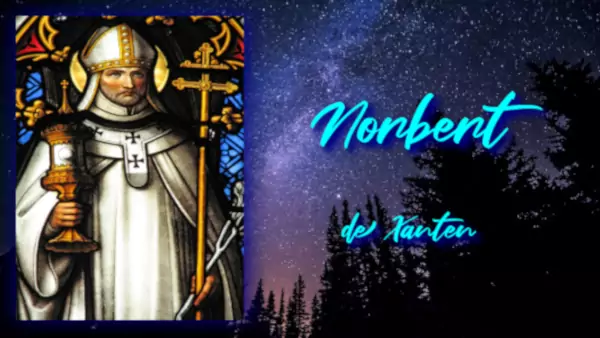06 June - Norbert is born in his father's castle in Gennep near Xanten in North Rhine-Westphalia. Around the age of nine, he was placed as a novice and then as an Oblate in the collegiate church of Xanten. He was then entrusted to the care of the ecolastic canon of the Xanten chapter to instruct him and prepare him for the priesthood through harsh discipline.
But by the favor of his cousin Emperor Henry V, he was taken from the world of prayer at the age of 18 and appointed chaplain of the collegiate church of Xanten. Here he led the life of the court nobility, while wearing the insignia of the imperial chapel in Aachen. He handled religious matters and dealt with religious diplomacy in a sumptuous and pleasant setting. However, as a simple vicar, he did not take vows, so by his status he led a free and luxurious life, which became increasingly dissipated once his ministry was completed.
In 1115, lightning struck him on his horse on a dark and rainy day in the Great Northern Plain on the road to Wreden in Westphalia. Remaining inanimate, he kept the blessed vision of the dead in paradise, especially those whom he had loved, prompting him to carry the word of eternal life and the bread of Christ to every corner of the West. Norbert becomes aware of his light life and decides to change his life radically. After getting back in touch with the monastic world and consulting the former canons who had trained him, he spends a few months in seclusion, then he is ordained, receives tonsure and dons a simple robe. After getting rid of all his possessions, he announced that he wanted to promote a rigorous reform of the canons by respecting the Rule of Saint Augustine.
But the priests who were installed and protected by the bishops had a bad opinion of this beggar priest who went to meet their flock or became familiar with the remote hamlets. Norbert, a priest with no fixed abode, was often chased away by the religious authorities wherever he was, and so he migrated from the mouths of the Rhine in Flanders to Northern France. But recognized, he is arrested and put on trial. In 1118, during the winter, barefoot, fed and sheltered by the generosity of the peasants, he crossed the Kingdom of France from north to south to join Pope Gelasius II passing through Languedoc. The latter, a former chancellor of Pascal II whom he had known in his other life as chaplain, recognized him and obeyed his vows, allowing him to continue preaching by awarding an official diploma.
From now on, on his return with the papal sesame, he paid a preliminary visit to the bishops before officially preaching in their dioceses. In Valenciennes he met Hugues de Fosses, chaplain to the bishop of Cambrai. Fascinated by Norbert, Hugues de Fosses then accompanied him on many of his journeys and, as a wonderful scribe and organizer, was already planning his meetings and evangelization missions.
The bishops worked together to get to know him better and to entrust him with missions. Encouraged by the Bishop of Laon Barthélemy de Jur, he first tried in vain to reform the canons of the Abbey of Saint-Martin de Laon but they rejected him. The marshy lands in the centre of the forest of Voas, the current forest of Saint-Gobain in the Aisne, have been deserted since the exactions of the Lords of Coucy, ferocious brigands. The bishop of Laon intends to install outside his town men and women of all conditions, who are looking for a religious and pure life and who flock from all over to meet the jovial Norbert. The place called Prémontré on the roadside between Saint-Quentin and Soissons, which the bishopric has controlled since its confiscation from the seigniory of Coucy, is ideal.
With the agreement of Pope Calixtus II, Norbert, protected by Bartholomew of Jur, fulfilled his dream by founding with forty disciples a monastic order of canons regular in charge of pastoral and evangelising missions. The installation in 1120 of the first abbey on the eponymous site of the Premonstratensian order was rough and difficult. In 1230 the order's record is impressive: in ten years, the increasingly urban installations multiplied towards the Duchy of Lorraine, the County of Champagne, Flanders, France, Picardy and Normandy. In the north of the Kingdom of France, where the Order's authorities work in concert with the royal administration, great progress has been made. Six abbots known in 1128 gave way to more than a hundred in 1164, not counting a number of priories and pastoral partnerships.
Saint Norbert, after more than a decade of pastoral peregrination, calls the Premonstratensians to take up the torch in order to ensure conversion and pastoral care with great Christian dignity. In Saxon and Slavonic society, he places his order at the service of the Gregorian reform. This involvement of the Archbishop provoked violent clashes on the part of the princes and former missionaries. He applied the same rule to his clergy in Magdeburg. His reform of the clergy in Magdeburg aroused discontent among his subordinates, who went so far as to attempt to assassinate him. The assassination failed by pure chance. Norbert, still dressed as a monk of his order, is morally slaughtered; his health is still in irreparable decline. He died of malaria and exhaustion in Magdeburg on 6 June 1134.








